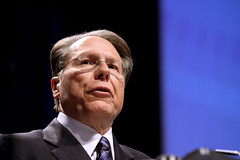Watching the gun control debate in the United States from afar, I was stuck by an odd dissonance. Something about the rhetoric of the pro-gun lobby didn’t quite fit with my own experience. It took me a while to realise what it was. And then I remembered, it went back to Baghdad, when I was there as a journalist in the long hot summer of 2003, as the US occupation began to go wrong, and the situations started to spin out of control.
Facing increasing attacks from Iraqi insurgents, US forces began searching civilian houses. If they found a gun, they considered it evidence that some one in the house was an insurgent. Men were arrested for having a Kalashnikov in the house.
Bear in mind, getting arrested in Iraq in those days didn’t mean a court hearing. It meant being jailed without trial. Often, it meant being sent to Abu Ghraib, where innocent men could be tortured, just because they had a gun in the house.
But almost every household in Iraq had a gun. You could search any random house, and the odds are you’d find a Kalashnikov, unless it had been especially well hidden. Kalashnikovs were as commonplace in Iraq as handguns are in the United States.
I remember asking a Baghdad shopkeeper how he protected his wares, given the widespread looting and lawlessness in the city. He went into the back and returned witha heavy machine-gun, complete with tripod stand and a belt of ammunition draped over his shoulder.”This is how I protect my shop,” he said.
Which, you would imagine, would go down well with Wayne LaPierre and the NRA. But alas, Iraqis had no Second Amendment rights.
In Iraq, the US military treated ownership of a gun as evidence that you were a criminal. Worse than a criminal, an armed insurgent and enemy combatant. And it was enough to get you locked up without trial.
Yet inside America’s own borders, it is an inalienable right to possess a gun. “Law-abiding gun owners will not accept blame for the acts of violent or deranged criminals,” says Mr LaPierre. “Nor do we believe the government should dictate what we can lawfully own and use to protect our families.”
In Baghdad, the US military dictated what you could lawfully use to protect your own family. Even though, in the lawlessness the US had caused when it disbanded the Iraqi police, people were being kidnapped off the streets and held for ransom. I heard of one case where a child was kidnapped. The father said he couldn’t afford the ransom and the kidnappers sent him one of his child’s fingers. After that, he paid up.
If you were from a minority, an Iraqi Christian say, or you worked for the Americans in the Green Zone, night letters would be pushed under your door threatening death unless you moved out. By 2004, those who didn’t leave would be shot down when they answered the door, or when they walked to their car in the morning. It was no surprise that most people chose to hang on to their Kalashnikovs, and risk them being found in an American raid.
Carjackers used to get in the passenger seat beside you at a red light if you forgot to lock the door. In Baghdad, they didn’t order you out of the car. They just shot you dead and tipped your body out on the street.
By the time I left Iraq in 2004, everybody was carrying handguns in their cars, under the passenger seat, even though if you were caught with one by an American checkpoint, that could get you arrested too.
All of which made Mr LaPierre’s impassioned defence of the American right to bear arms, and the polarised debate in the Senate, sound rather strange to my ears this week.



Leave a Reply